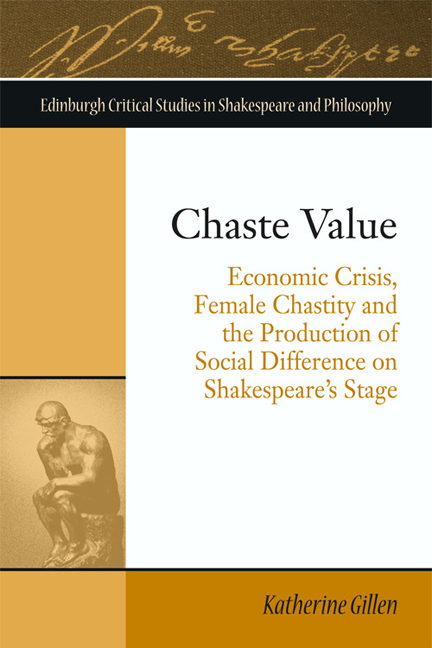 Chaste Value
Chaste Value Published online by Cambridge University Press: 22 December 2017
The early modern English stage frequently renders female chastity, virginity as well as married fidelity, in economic terms. Images of jewels, pearls and treasure abound, indicating chastity's immeasurable worth. Leontio in Thomas Middleton's Women Beware Women, for example, refers to his chaste wife Brancha as a ‘most matchless jewel’ and sequesters her, believing that ‘’tis great policy / To keep choice treasures in obscurest places’. In many instances, this conventional imagery is replaced with the more overtly commercial terms of commodity, usury and currency. Paroles in William Shakespeare's All's Well That Ends Well, for example, calls virginity a ‘commodity will lose the gloss with lying; the longer kept, the less worth’. Monticelso in John Webster's The White Devil compares unchaste women to ‘the guilty counterfeited coin / Which whosoe'er first stamps it brings in trouble / All that receive it’, and in Middleton's The Revenger's Tragedy, Lussurioso hopes that Castiza's chastity will be ‘br[ought] … into expense, for honesty / Is like a stock of money laid to sleep / Which ne'er so little broke, does never keep’. This economic discourse is as common as it is imprecise, often conflating the woman, her spiritual essence and her genitalia in its attempt to identify the source of chastity's value. In each case, the drama calls attention to chastity's interpolation into, or its resistance to, economic forces.
Chaste Value: Economic Crisis, Female Chastity and the Production of Social Difference on Shakespeare's Stage considers chastity's significance in light of this ubiquitous economic imagery, situating dramatic representations of chastity within broader anxieties about the social, ethical and epistemological effects of early capitalism. As I will demonstrate, many plays by Shakespeare and his contemporaries invoke chastity – itself a virtue, a symbol of stability, a quasi-commodity and a mode of selfhood – to interrogate competing understandings of personal value and to explore the ramifications of incorporating people, their labour and their productions into commercial exchange. As such, I argue, chastity informs the theatre's staging of subjectivities born of commoditisation as well as its articulation of emerging distinctions between human and economic value. Chastity, moreover, figures centrally in the process whereby the stage disrupts pre-capitalist understandings of intrinsic personal value and, in response to this disruption, reallocates personal value according to hierarchies of gender, race, class and nationality.
To save this book to your Kindle, first ensure [email protected] is added to your Approved Personal Document E-mail List under your Personal Document Settings on the Manage Your Content and Devices page of your Amazon account. Then enter the ‘name’ part of your Kindle email address below. Find out more about saving to your Kindle.
Note you can select to save to either the @free.kindle.com or @kindle.com variations. ‘@free.kindle.com’ emails are free but can only be saved to your device when it is connected to wi-fi. ‘@kindle.com’ emails can be delivered even when you are not connected to wi-fi, but note that service fees apply.
Find out more about the Kindle Personal Document Service.
To save content items to your account, please confirm that you agree to abide by our usage policies. If this is the first time you use this feature, you will be asked to authorise Cambridge Core to connect with your account. Find out more about saving content to Dropbox.
To save content items to your account, please confirm that you agree to abide by our usage policies. If this is the first time you use this feature, you will be asked to authorise Cambridge Core to connect with your account. Find out more about saving content to Google Drive.